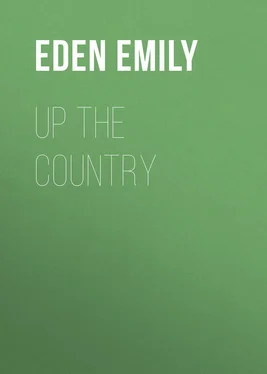Emily Eden - Up the Country
Здесь есть возможность читать онлайн «Emily Eden - Up the Country» — ознакомительный отрывок электронной книги совершенно бесплатно, а после прочтения отрывка купить полную версию. В некоторых случаях можно слушать аудио, скачать через торрент в формате fb2 и присутствует краткое содержание. Жанр: foreign_antique, foreign_prose, на английском языке. Описание произведения, (предисловие) а так же отзывы посетителей доступны на портале библиотеки ЛибКат.
- Название:Up the Country
- Автор:
- Жанр:
- Год:неизвестен
- ISBN:нет данных
- Рейтинг книги:3 / 5. Голосов: 1
-
Избранное:Добавить в избранное
- Отзывы:
-
Ваша оценка:
- 60
- 1
- 2
- 3
- 4
- 5
Up the Country: краткое содержание, описание и аннотация
Предлагаем к чтению аннотацию, описание, краткое содержание или предисловие (зависит от того, что написал сам автор книги «Up the Country»). Если вы не нашли необходимую информацию о книге — напишите в комментариях, мы постараемся отыскать её.
Up the Country — читать онлайн ознакомительный отрывок
Ниже представлен текст книги, разбитый по страницам. Система сохранения места последней прочитанной страницы, позволяет с удобством читать онлайн бесплатно книгу «Up the Country», без необходимости каждый раз заново искать на чём Вы остановились. Поставьте закладку, и сможете в любой момент перейти на страницу, на которой закончили чтение.
Интервал:
Закладка:
All the party out of both steamers dined at Mr. T.’s, and moreover a third steamer came up from Calcutta this morning, containing, amongst other passengers, a Mrs. P. and her pretty little daughter, who are great favourites with all our gentlemen, and they dined and went with us to a ball given by the regiment.
There were great doubts whether a ball could be made out, as the want of ladies in the Mofussil makes dancing rather difficult. However, we took a large party, and the ladies we had seen in the morning all assembled and had raised two or three extras. The mess-room was very prettily illuminated, with G.’s arms painted on the floor, and they gave us a grand supper, so it all did very well. I wish you could have seen the dancers. A Mrs. – , something like Mrs. Glover the actress, only much fatter, with a gown two inches shorter then her petticoat, bounding through every quadrille, with her three grown-up sons dancing round her. She is an exemplary mother, and has been a widow many years, and a grandmother many more; but she never misses a dance!
Tuesday, Nov. 14.We did not get home last night till half-past one, and were up at seven to go on board, and we had to go smirking and smiling through all that regiment again, with all the other gentlemen to go to the boat with us; but we may have a rest to-day. It certainly is a hard-working life, is not it? I never get ‘my natural rest,’ as Dandie Dinmont says, in the steamer for noise, and on the shore for work.
I wonder how you would be in this state of life. I often try to fancy you. Sometimes I think you would be amused for about five minutes, but generally I opine you would go raving mad! I constantly long to be in an open carriage with four post-horses, along with G., and that we might drive through a pretty country, and arrive at an inn where nobody could dine with us or ask us to a ball. However, to-morrow we are to get into double state, when we reach our tents, as it is of more importance with the up-country natives; so it is of no use to think of bettering ourselves.
Camp, Benares, Wednesday, Nov. 15.We arrived at Benares at ten, lay to all through the heat of the day, whilst the servants unloaded the flat, and then steamed up within view of the city, as far as the rajah’s country-house, Ramnuggur, and then dropped down again, thereby seeing the whole of the city. The glare was horrible, but the buildings were worth all the blindness that ensued. Such minarets and mosques, rising one above the other to an immense height; and the stone is such a beautiful colour. The ghauts covered with natives, and great white colossal figures of Vishnu lying on the steps of each ghaut. Benares is one of their most sacred places, and they seem to spare no expense in their temples. We mean to keep our steamer here, and to go out sketching in it. But it would take a whole week to draw one temple perfectly; the ghaut where we landed was as pretty a sight as any. All our elephants, two or three hundred baggage camels (they are much larger beasts to live with than I thought), bullock carts without end, and everybody loading every conveyance with everything. There are twenty shooter suwars (I have not an idea how I ought to spell those words), but they are native soldiers mounted on swift camels, very much trapped , and two of them always ride before our carriage. This looks more like the ‘land of the east,’ in all its ways, than anything we have seen.
We landed at five, and drove four miles through immense crowds and much dust to our camp. The first evening of tents, I must say, was more uncomfortable than I had ever fancied. Everybody kept saying, ‘What a magnificent camp!’ and I thought I never had seen such squalid, melancholy discomfort. G., F., and I have three private tents, and a fourth, to make up the square, for our sitting-room, and great covered passages, leading from one tent to the other.
Each tent is divided into bed-room, dressing-room, and sitting-room. They have covered us up in every direction, just as if we were native women; and, besides that, there is a wall of red cloth, eight feet high, drawn all round our enclosure, so that, even on going out of the tent, we see nothing but a crimson wall.
Inside each tent were our beds – one leaf of a dining-table and three cane chairs. Our pittarrahs and the camel-trunks were brought in; and in about half an hour the nazir came to say they must all, with our books, dressing-cases, &c., be carried off to be put under the care of a sentry, as nothing is safe in a tent from the decoits; so, if there were anything to arrange, there would be no use in arranging it, as it must all be moved at dusk. The canvas flops about, and it was very chilly in the night, though that is the only part I do not object to, as when we get our curtains that will be merely bracing; but it feels open-airish and unsafe. They say everybody begins by hating their tents and ends by loving them, but at present I am much prepossessed in favour of a house. Opposite to our private tents is the great dining-tent, and the durbar tent, which is less shut up, and will be less melancholy to live in. God bless you, dearest! When I am tired, or tented , or hot, or cold, and generally when I am in India, I have at least the comfort of always sitting down to tell you all about it, and ‘There is no harm in that ,’ as the man says in ‘Zohrab.’
CHAPTER IV
I HAVE been obliged to give up the five last days to other letters, to the manifest disadvantage of my Journal, your unspeakable loss, and my own deep regret; but what can be done? It is just possible to do all we have to do – just not impossible to write it down once , but quite impossible either to live, or to write it over again; and I have had a large packet of very old English letters since we came here, which set me off answering them.
The résumé of our proceedings, since I sent off my Journal to you last Thursday, Nov. 16, is shortly and longly this: – Friday, we went a large party to the town in carriages; when the streets grew too narrow for carriages, we got on elephants; when the elephants stuck fast, we tried tonjauns; and, when the streets contracted still further, we walked; and at last, I suppose, they came to a point, for we came back. We saw some beautiful old temples, and altogether it was a curious sight. Prout would go mad in a brown outline frenzy on the spot – the buildings are so very beautiful for his style. I forgot to mention that at half-past six on Friday morning we went to a review on horseback. Saturday, we again got up at six, and F. and I went in the open carriage to sketch a tempting mosque. At eleven we received many more visitors than the tent would hold – the aides-de-camp could hardly come in with them.
G. held a durbar in the afternoon, at which seventy of the native nobility appeared. The Rajah of Benares came with a very magnificent surwarree of elephants and camels. He is immensely rich, and has succeeded an uncle who adopted him, to the great discomfiture of his father, who goes about with him in the capacity of a discontented subject. We had thirty-six people at dinner. Sunday, we went to church, and underwent the worst reading and preaching I ever heard from Mr. – , who in general preaches to his clerk; but this time the church was very full, and the congregation were all hoping to hear a little something that might do them good from our dear Y. In the afternoon G. and I went out on an elephant, and, in an attempt to make a quiet and rural cut home, nearly drowned one of our outriding camels and his rider; so we came home, much ashamed of ourselves, by the common dusty road. Monday, we got up early, and set off at seven, to pay a visit to the old Delhi Begum. The particulars I narrated with wonderful accuracy, bordering on tediousness, to M., and I am confident you would not wish me to repeat them.
Читать дальшеИнтервал:
Закладка:
Похожие книги на «Up the Country»
Представляем Вашему вниманию похожие книги на «Up the Country» списком для выбора. Мы отобрали схожую по названию и смыслу литературу в надежде предоставить читателям больше вариантов отыскать новые, интересные, ещё непрочитанные произведения.
Обсуждение, отзывы о книге «Up the Country» и просто собственные мнения читателей. Оставьте ваши комментарии, напишите, что Вы думаете о произведении, его смысле или главных героях. Укажите что конкретно понравилось, а что нет, и почему Вы так считаете.












